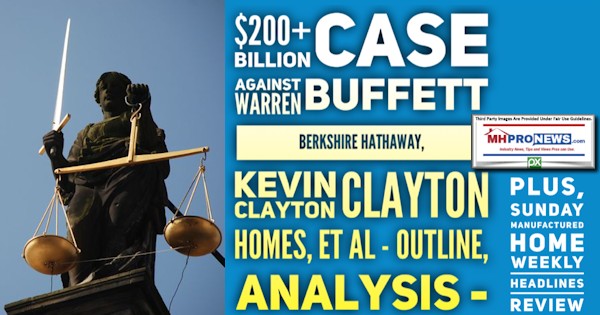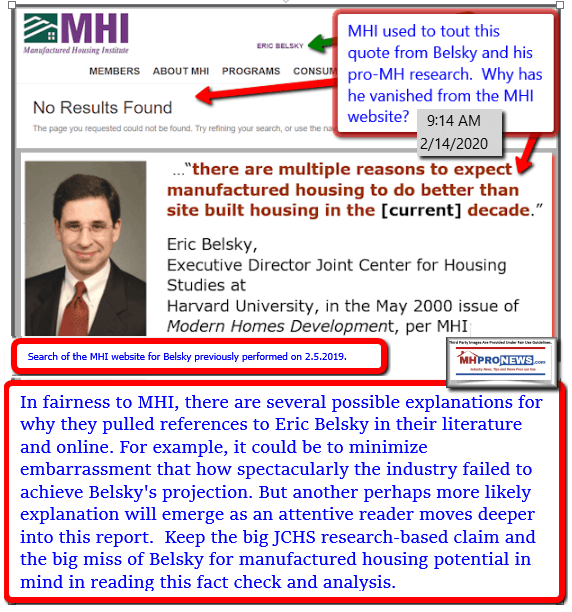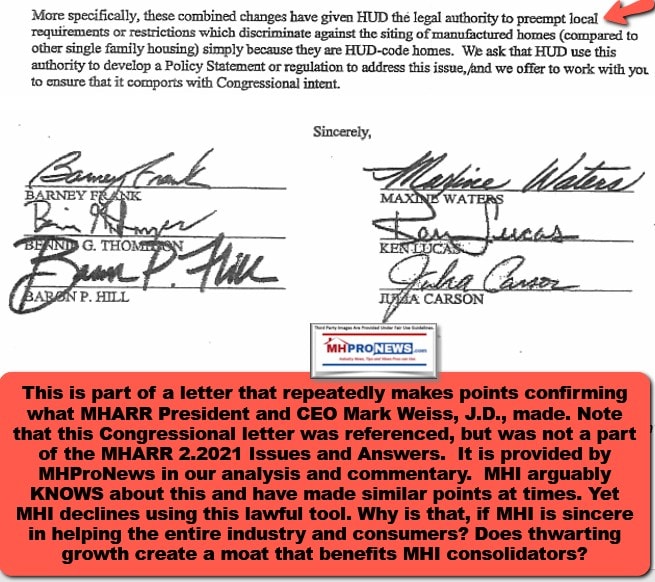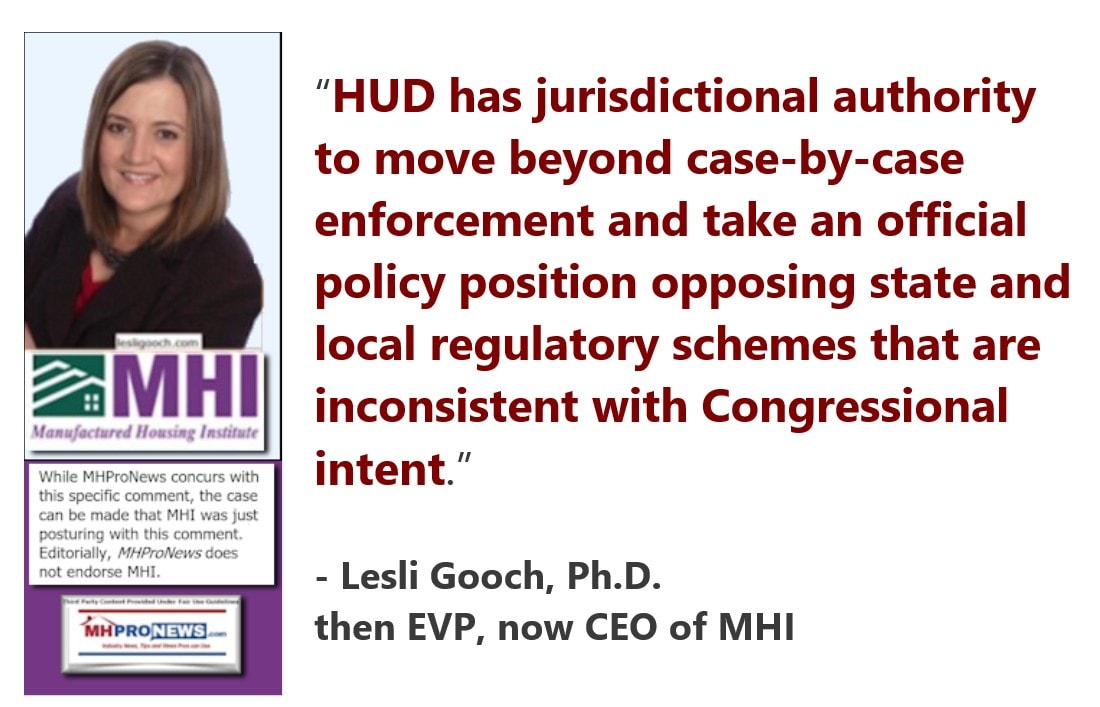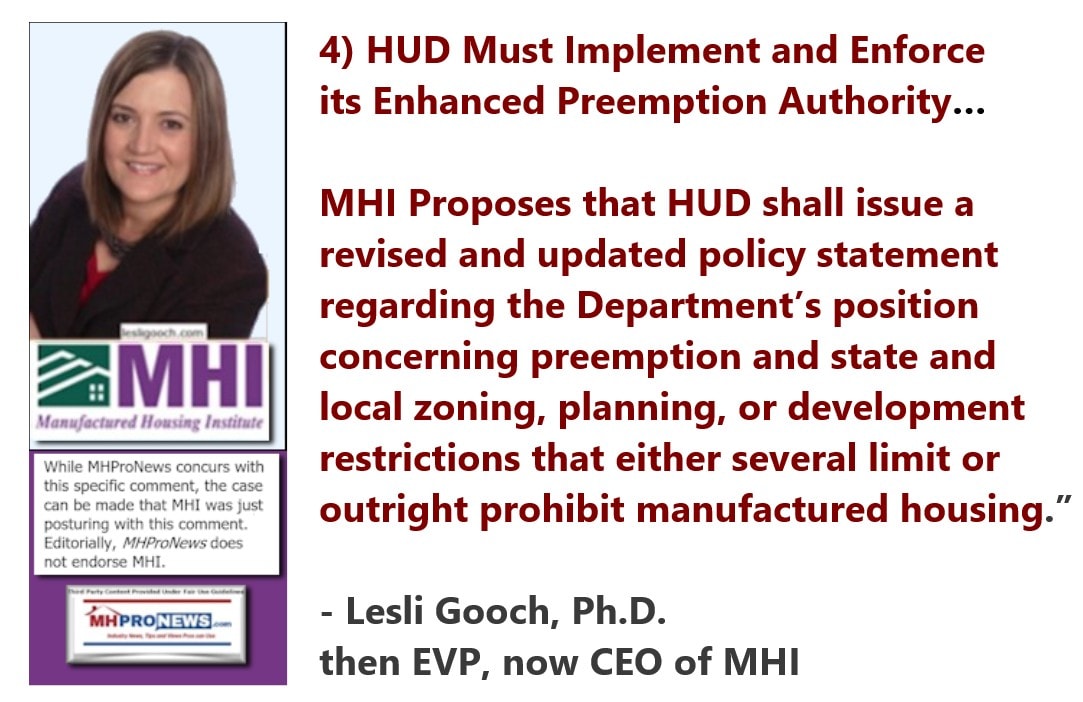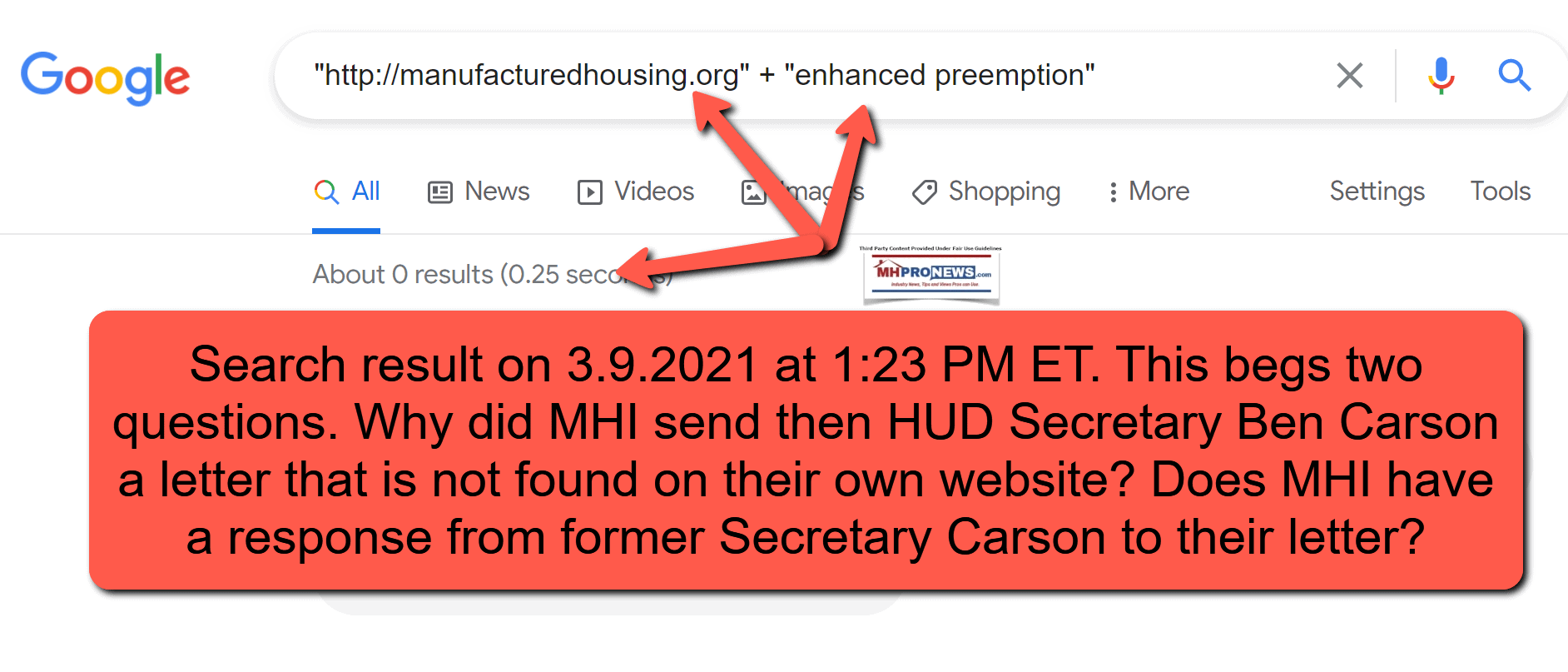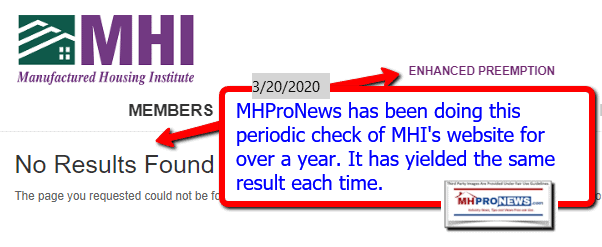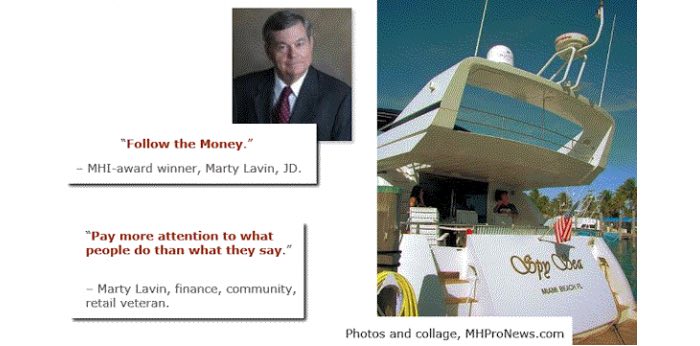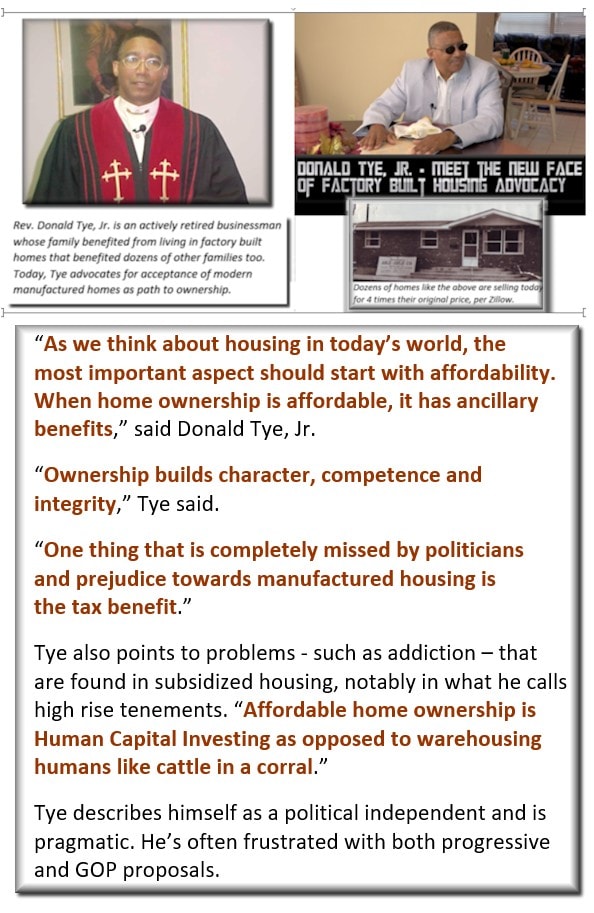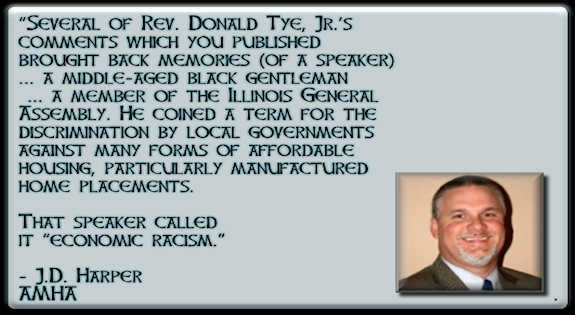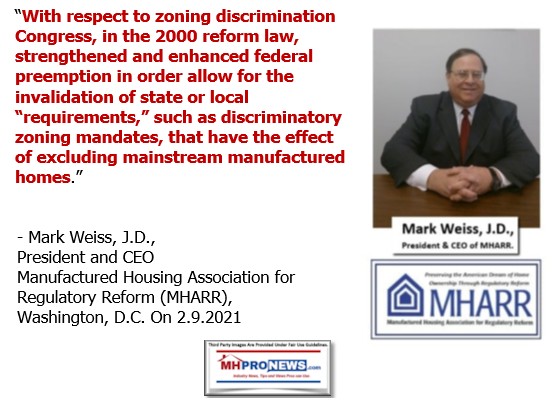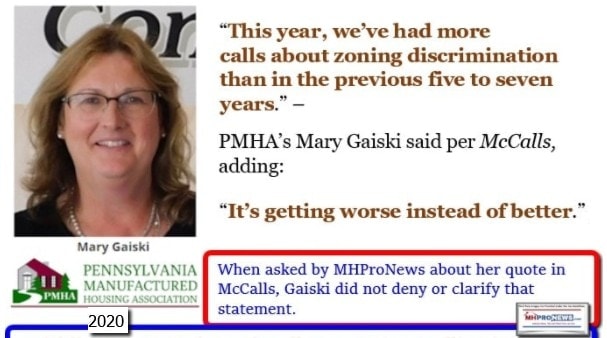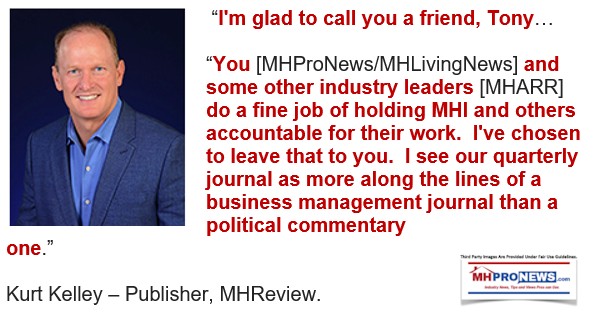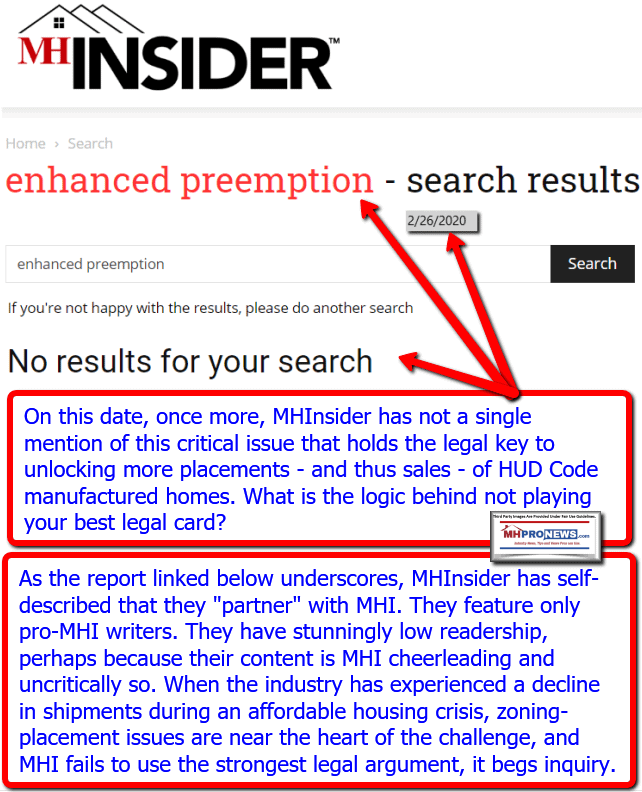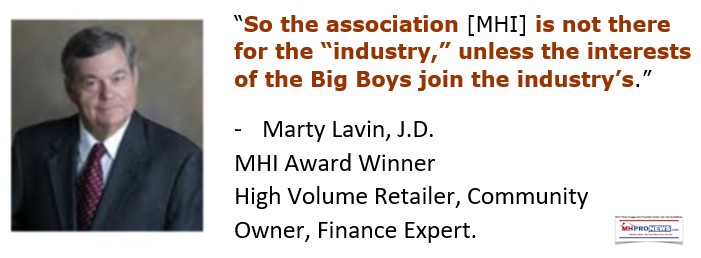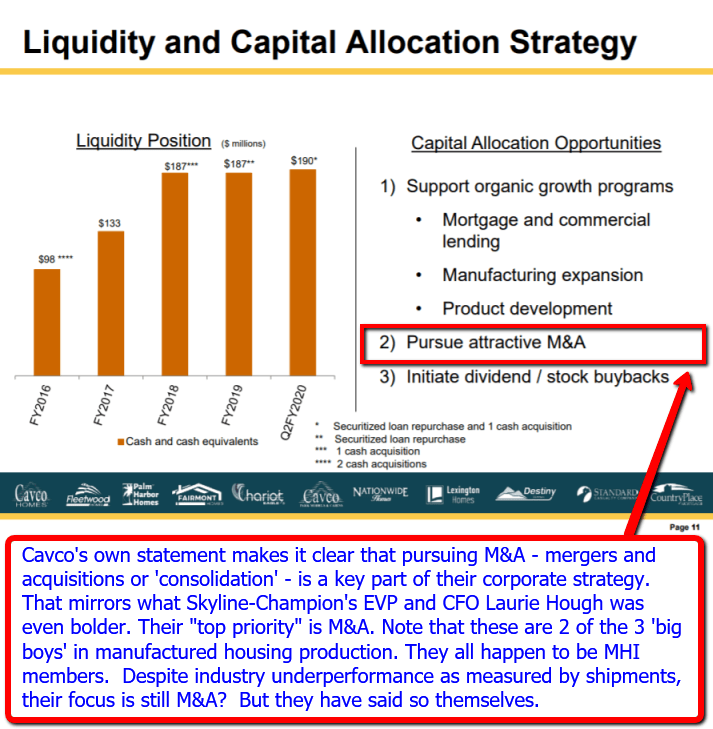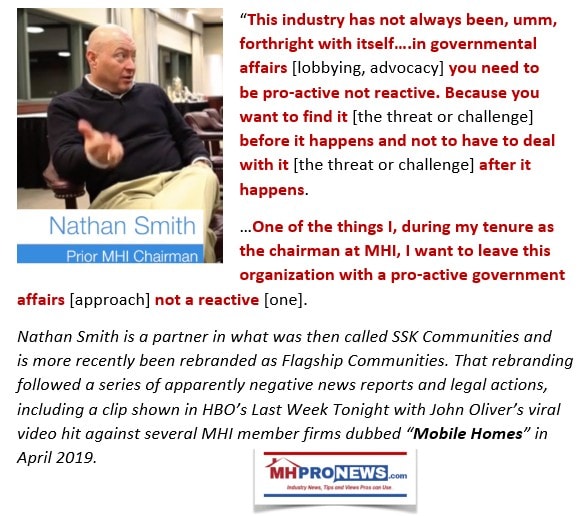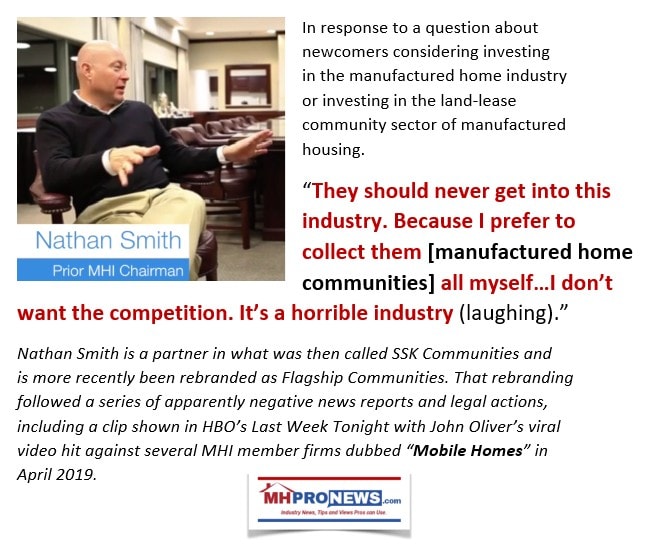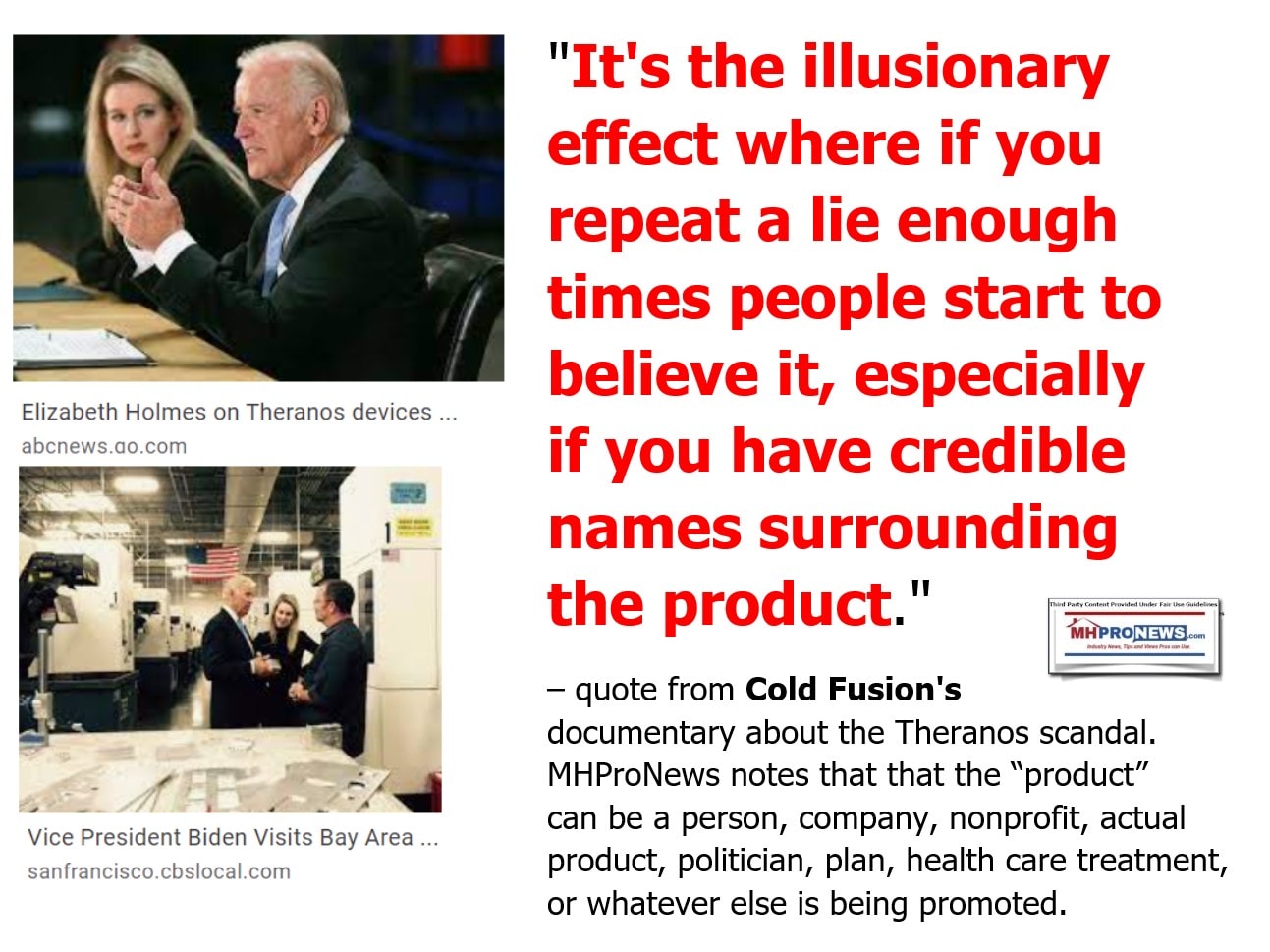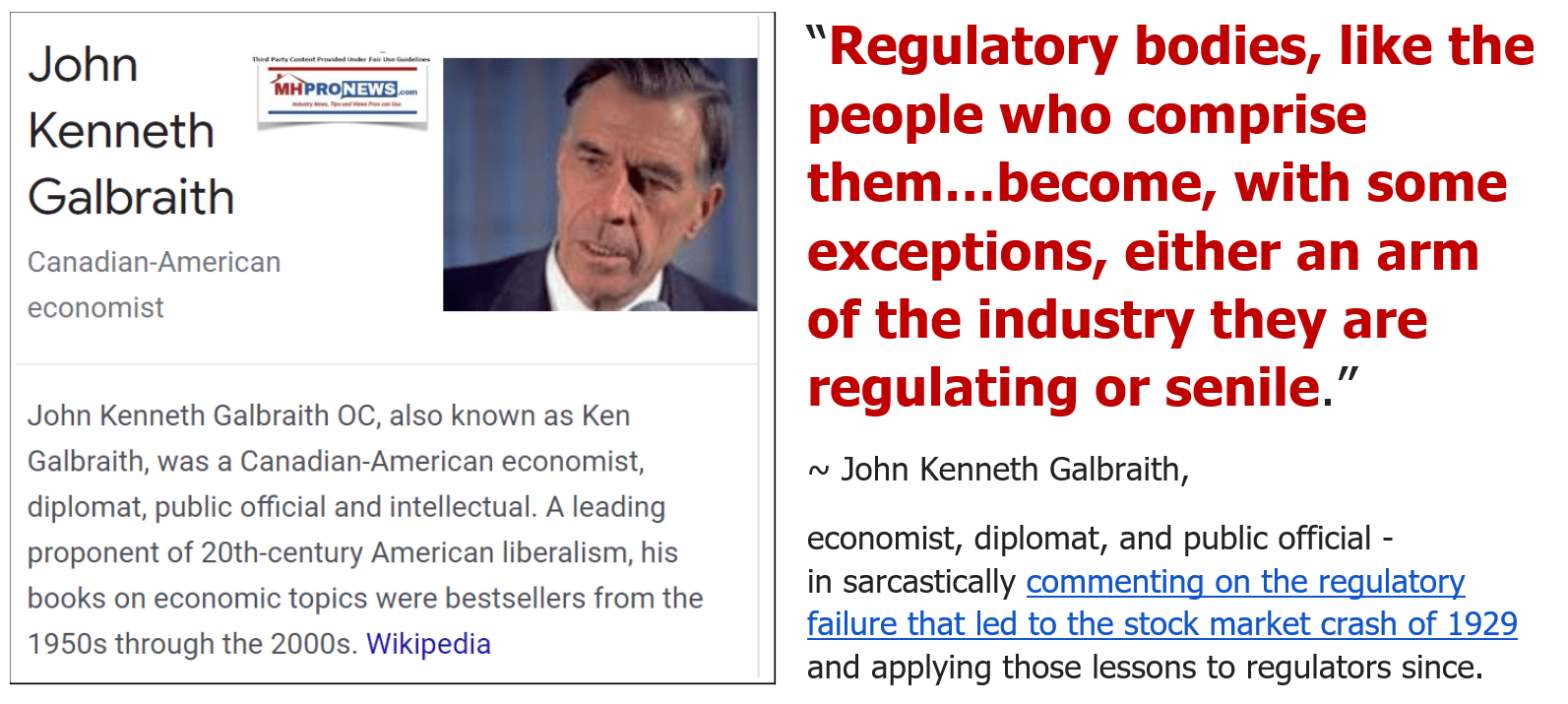To launch June 2021 as National Home Ownership Month, the National Housing Conference (NHC) said that the Biden White House has made affordable home ownership one of two pillars of their plan. Quite correctly, the Biden White House said that home ownership is a proven path to wealth creation, something that President Donald J. Trump’s HUD Secretary Ben Carson also said. But Biden’s HUD Secretary Marcia Fudge, as a series of recent revelations by the Manufactured Housing Association for Regulatory Reform (MHARR) and others have made clear, has oddly not mentioned HUD Code Manufactured Housing unless she was directly asked about it. Yet, manufactured homes are primarily regulated by HUD, Secretary Fudge’s domain. Democrats have had much to say about existing laws that under both Democratic and Republican administrations alike have for whatever reasons languished. That is evidently true even though good laws under HUD’s care made the path to affordable home ownership for minorities and all other Americans of whatever color or creed possible.
Who said? Congress did in passing by a widely bipartisan margin the Manufactured Housing Improvement Act of 2000 (MHIA or 2000 Reform Law). Congress and various third-party research studies have for years praised the advances in HUD code manufactured homes.
For example. During President Barack Obama and his Vice President Joe Biden’s term of office, HUD commissioned ground-breaking research on modern manufactured homes. That Obama-Biden era university-level research on regulatory barriers facing manufactured housing debunked numerous myths and misconceptions about manufactured homes. Fast forward to today. Despite the data, statements by individuals and organizations in the know clearly reveals that since enacted, the MHIA has not been properly enforced. Who said? Beyond experts and advocates, Democratic lawmakers involved in the passage of the MHIA. As early as 2003, they lodged formal complaints with HUD about those failures to carry out Congressional intent.
That brief roughly 300-word recap is enough to ask the obvious question. What the devil is going on in Washington, D.C. when the same promises are being made decades later that we’re supposed to have been solved by the passage of the MHIA – a.k.a. the 2000 Reform Law?
To set the stage for the facts, evidence, and reams of research that will be cited below, a bit of historical perspective is useful. Because as George Santayana is credited with saying, “Those who cannot remember the past are condemned to repeat it.”
To be accurate but politically incorrect, under Democratic and Republican leadership alike, Americans went to war and engaged in policy decisions that in hindsight turned out to be based upon deception, misdirection, half-truths, and outright lies. There were policy initiatives like that of President Richard M. Nixon (R) ‘opening the door’ to Communist China. In hindsight, that U.S.-China initiative has been disastrous to the vast majority of Americans. Nevertheless, others from both major parties followed Nixon’s lead. China is now more of a threat today than when Nixon’s initiative began, as the graphic on trade linked here and the military comparisons linked here reflect. American led-Western investments and American dollars funded the growth of what is now contemporary mainland China. Communist China is now America’s chief economic rival, using that money to build the largest navy in the world, with a range of nuclear, cyber, bio-weapons, propaganda tools, and more. No one party or person carries the full blame, because both engaged in this avoidable and long-term major miscue. The lesson? Politicians are people. They may or may not be trustworthy. Even on major issues, government officials and political leaders can make major mistakes.
President Lyndon Banes Johnson was accused by PBS of having effectively engineered the escalation of the War in Vietnam by staging a faux attack. The Johnson Administration accused the North Vietnamese of having attacked U.S. Navy vessels in the Gulf of Tonkin “incident,” per left-leaning PBS and numerous other sources including Wikipedia. Democrats and Republicans have each made such problematic decisions since World War II. That same President Lyndon B. Johnson also launched his “War on Poverty” and “Great Society” programs. Approaching 60 years later, we have similar levels of poverty today as then, despite spending sums roughly equal to the national debt to fight that war, per a study by the Heritage Foundation.
The President George W. Bush Administration used mainstream media assets across the left-right spectrum to cause the U.S. and a coalition of allied nations to invade Iraq. The now notorious claim was that America’s military had to be used to eliminate weapons of mass destruction (WMDs). After the war was launched on what left-leaning Wikipedia says were misleading claims, those WMDs were never found. The award-winning documentary-drama, Shadows of Liberty interviewed several from the mainstream media that were supposedly manipulated by false information.
But Shadows of Liberty also explored how corporate interests used ‘the news’ and mainstream media to deflect from Nike’s abusive labor conditions in Vietnamese sweet shops. CBS News silenced their own reporter in a business deal with Nike to co-sponsor the Winter Olympics that year. The WalMart Effect documentary explored how that firm abused workers in China and Central America, all while undermining often decades old, successful small businesses in the U.S., and gave examples of Walmart’s corporate power being flexed and rewarded.
Summing up, there are historical examples of the manipulation of the American people and American voters. President Dwight D. Eisenhower (R) warned against the military-industrial complex. President John F. Kennedy (D) said he wanted to break up the CIA into a thousand pieces and scatter it to the winds.

These are examples that there are plenty of voices across the left-center-right divide that have provided evidence that time and again proved that claims previously made by candidates and public officials later proved to be an illusion.
The point is this. Whatever one might think of House Minority Whip James Clyburn, he was demonstrably correct in saying that whatever has happened before can happen again. History does not repeat precisely. But certain patterns are evidenced. President Kennedy used back-channels to communicate with the Soviets and Cubans, because Kennedy did not trust his own State Department enough, said PBS and BrainStorm Media. More recently, President Trump once more clearly expressed his distrust various “deep state” elements in the federal government, with Dr. Anthony Fauci being but one of several possible examples. But what both Presidents Kennedy and Trump reflected on various occasions were similar concerns about federal agencies – yet each leader served their terms decades apart.
Current events must be viewed through a historical lens. Otherwise, past mistakes that were avoidable could be repeated again. These are not just left-right concerns, they are matters of historic evidence that should be recalled by all people of good will from whatever background.
Just the Facts – Key Statements by Lawmakers, Third-Party Researchers, Advocates
The introduction above states that decades of research has proven the value of modern manufactured homes. Their factory-built housing antecedents were in various ways praised and supported by public policy too.
A series of linked reports and quoted statements will provide the evidence for those claims. In no particular order of importance, are the following which can be reviewed at the reader’s leisure. These are posted below to make clear that the evidence for manufactured homes are solid and routinely debunk common misconceptions.
Among those common misconceptions that was subject to peer-reviewed research was that of now Dr. Lisa Tyler, Ph.D. Tyler’s thesis on community attitudes towards manufactured housing observed the simple statement. The evidence supports manufactured homes, nevertheless, they are still misunderstood. That should beg the question, why?

Scholastica “Gay” Cororaton, Certified Business Economists (CBE), made a similar statement in her seminal research on manufactured homes which was published in the National Association of Realtors (NAR) Realtor University Journal for the Center of Real Estate Studies (pages 48-78).
Here concluding remarks were summed up as follows: “Compared with the unregulated mobile/trailer homes of the past, the manufactured homes built after 1976 have a higher level of safety, durability, and quality, and the small fraction of homes damaged during hurricanes attests to their safety and durability. New design features and multi-section homes are increasingly giving them the look of traditional site-built homes. These safety standards and improved features should lead to the increasing acceptance of manufactured homes as a safe, durable, and affordable type of housing.”
Cororaton’s fact and evidence-based research demonstrated that the cost for living in rental housing was routinely more than the cost for living in a modern HUD Code manufactured homes.
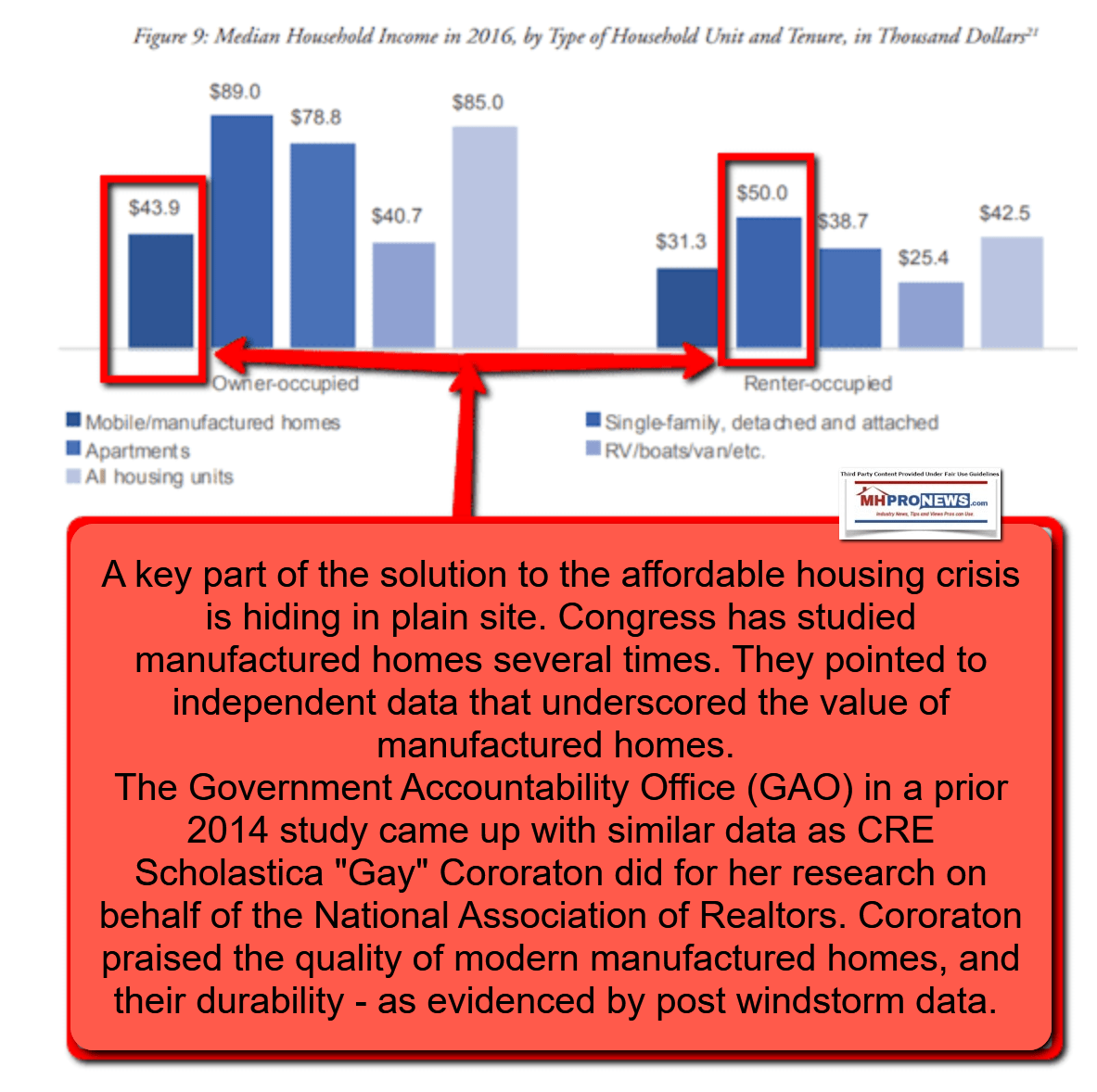
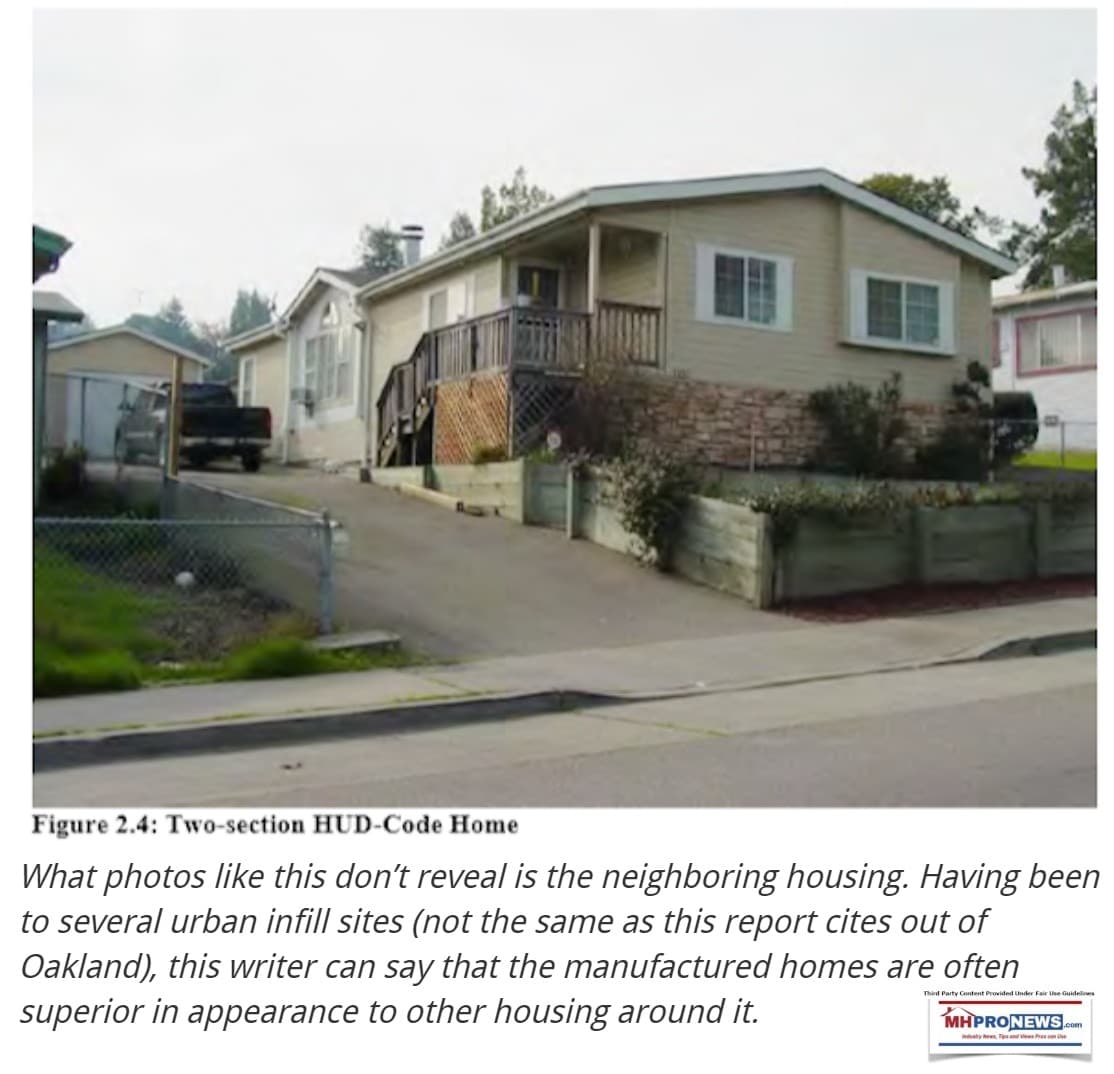
The Government Accounting Office (GAO) did research on manufactured housing in 2014 that came to some similar conclusions as Cororaton. For instance, on the payments on manufactured homes that are financed, the GAO provided the following graphic.
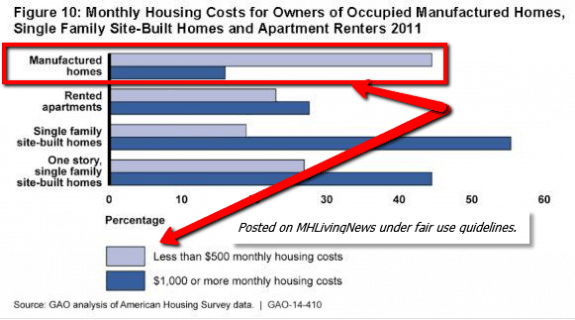
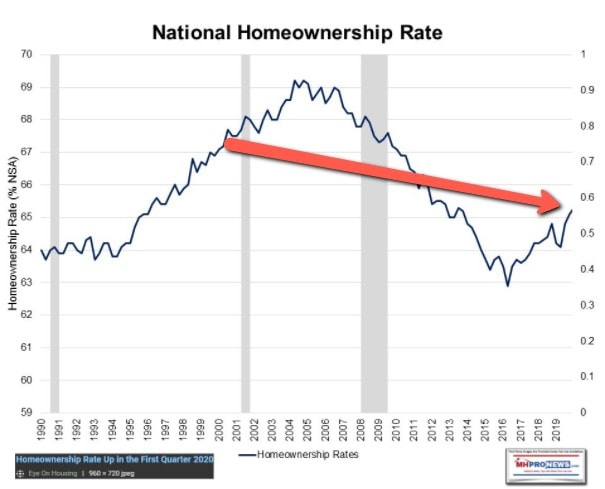
HUD Secretary Julian Castro (D) had favorable things to say about HUD Code manufactured homes.
HUD Secretary Ben Carson (R) praised manufactured homes too, but not just when he was in front of a manufactured housing audience. An example of Dr. Carson’s lifting up of manufactured housing is reflected in this comment below.
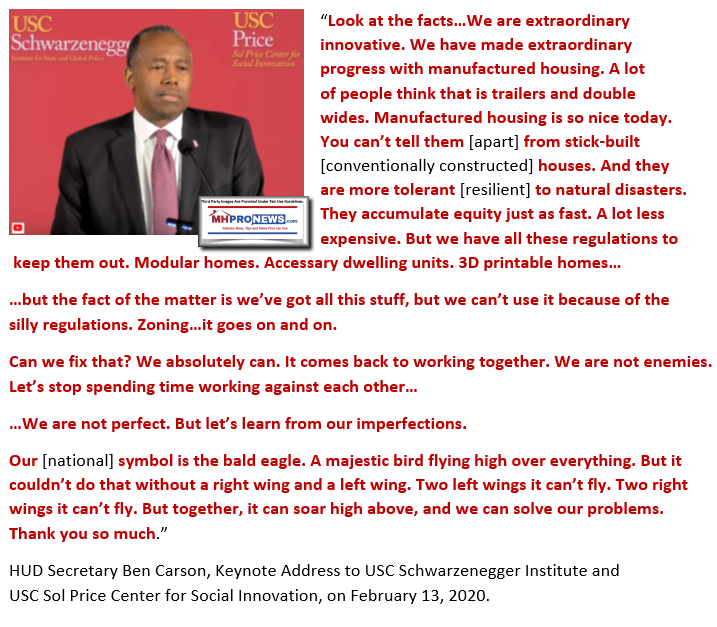
Years of research on these issues are found in reports from the following resource collections, linked below.


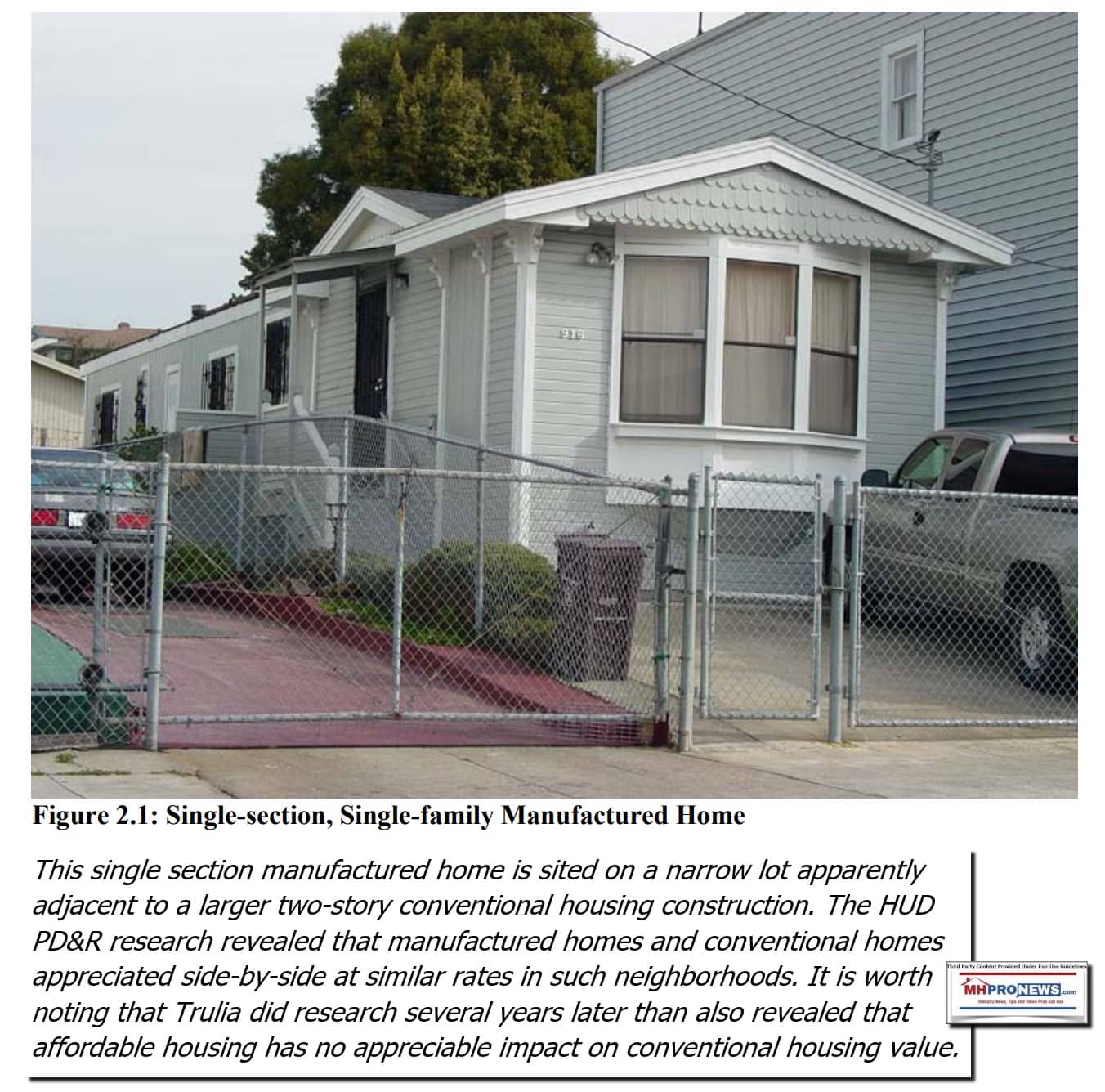
Oddly, there is no similar collection of insightful third-party research about manufactured housing on the Manufactured Housing Institute (MHI) website. Over the years site-searches of their website, examples of which are shown below, illustrate that point. It is at best odd behavior for MHI, given the industry’s underperformance for over 20 years.
Hold those thoughts, because Democratic lawmakers addressed then HUD Secretary Mel Martinez (R), encouraging Martinez to fully and properly implement the “enhanced preemption” clause of the Manufactured Housing Improvement Act of 2000 (MHIA or 2000 Reform law).
Current MHI CEO Lesli Gooch has said that HUD has the authority to preempt local zoning under what is often referred to as enhanced preemption made part of HUD’s federal authority under the 2000 Reform law. The statements above and below from MHI’s Gooch were shared with their members via email. But oddly, they are not found on MHI’s website where the public, media, advocates, or researchers might find them.
Indeed, when the phrase “enhanced preemption” is used in a Google search with MHI, there are no results to be found online. By contrast, the smaller Manufactured Housing Association for Regulatory Reform has numerous such results available for the public, advocates, lawmakers, etc.
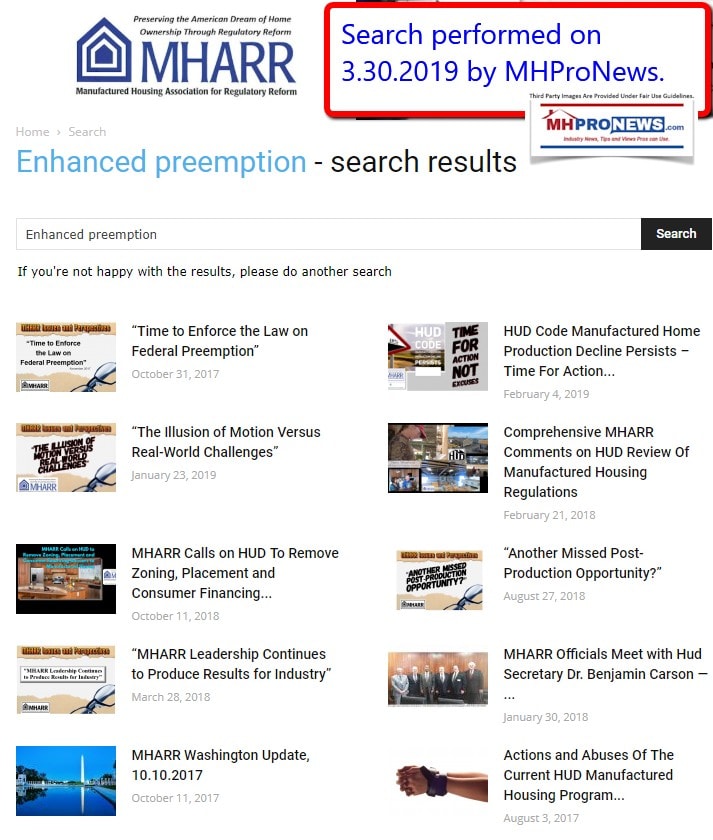
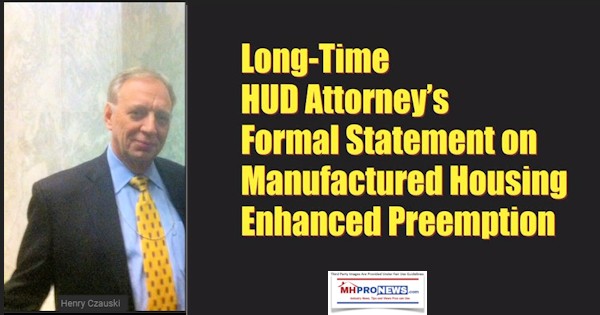
Building on the point, MHI recently claimed in writing to their members that they had effectively staged certain question for a U.S. Senate hearing between lawmakers and HUD Secretary Fudge, MHI failed to ask about that key issue.
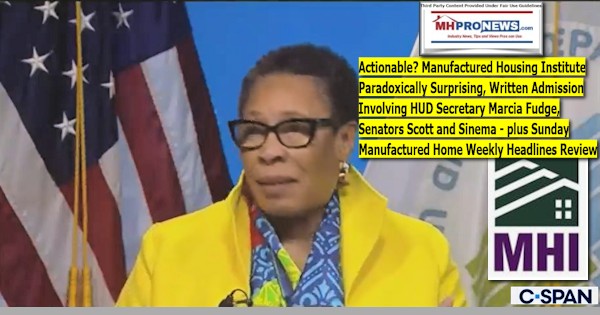
This lends credence to those critics of MHI that have long said that MHI postures rather than performs what they claim to be working to accomplish. When one wonders why MHI may not be doing what they claim, MHI award winner Marty Lavin shares a simple principle that objective investigators, researchers, and reporters have long turned to for guidance. Follow the money trail, and pay more attention to the actual deeds than to the words mouthed.
To tee up the following section, MHProNews hereby refers to the statements that follow.
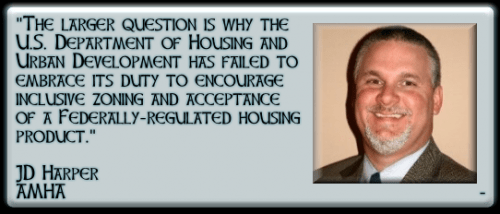

The Joe Biden presidential campaign website aptly observed that access is a form of currency in Washington, D.C. MHI has frequently demonstrated that access. How did they use it?
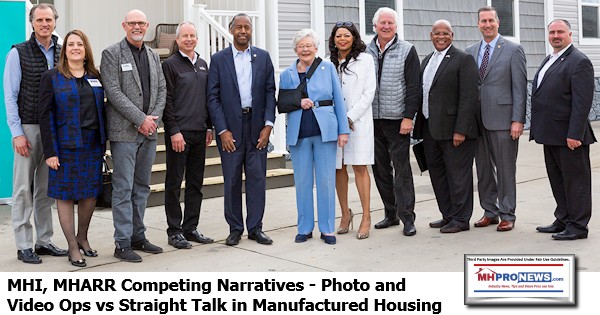
There is no known evidence that HUD Secretary Carson ever mentioned the words “enhanced preemption” during his term in office. While MHI sent a letter in July of 2019 to HUD Secretary Carson, that included that pull quote shown above. But that letter was sent only after years of public pressure from MHProNews, MHLivingNews, MHARR, and others. Before and since that letter, MHI had numerous face-to-face opportunities with Secretary Carson. He was clearly saying things that were pro-manufactured housing. Which begs the question. Why didn’t MHI simply raise the preemption issue face-to-face so it could have been nailed down between MHI leaders and Secretary Carson as might have been necessary?
While MHI has been claiming to be working to promote the manufactured home industry’s growth, and while the percentage of home ownership rose during the Trump-Pence years, the volume of manufactured housing sales actually declined for some 2½ years.
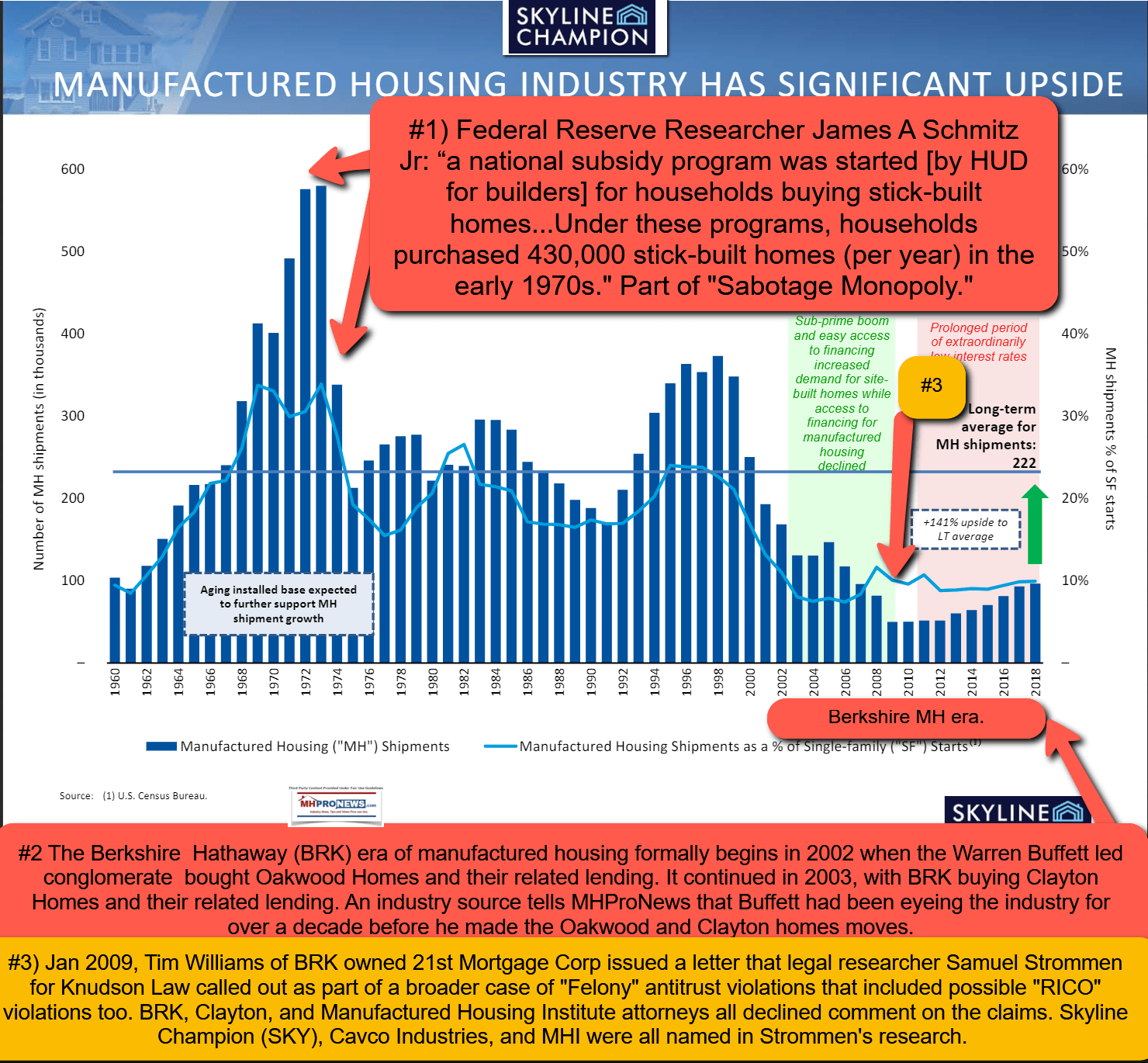
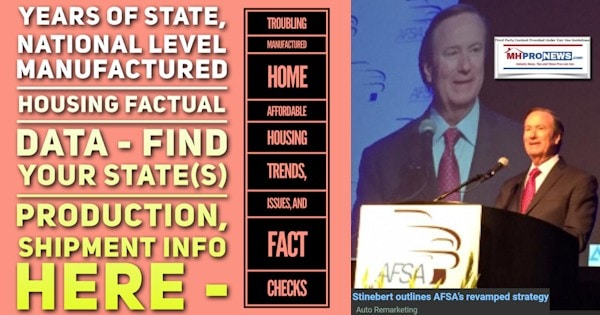
These concerns will be examined more carefully following the next section.

Biden-Harris and HUD Secretary Fudge on Wealth Building Through Affordable Manufactured Home Ownership
One of the points from the above is this. If the Biden-Harris White House and HUD Secretary Fudge sincerely want to implement a rapid path to equal access to affordable housing for potentially millions of Americans, the laws needed already exist. The quoted and linked third-party research in this report and analysis makes it clear that the fact- and evidence-based rationale for those pro-manufactured home laws already exist.
MHI has as a rival trade group the independent producers focused Manufactured Housing Association for Regulatory Reform (MHARR). Unlike MHI, which self-claims to work for “all segments” of manufactured housing – meaning, they are an umbrella like trade group that represents both production and post-production interests. By contrast, MHARR is more focused. MHARR has as its raison d’etre – reason for existing – regulatory issues. For instance, MHARR is not promotional in nature. MHARR’s focus is instead on regulatory relief from overreaches when needed and/or the proper enforcement of existing laws.

Historically speaking, MHI and MHARR teamed up to enact the MHIA. MHARR says that the two worked to pass the DTS as part of HERA 2008 as well.
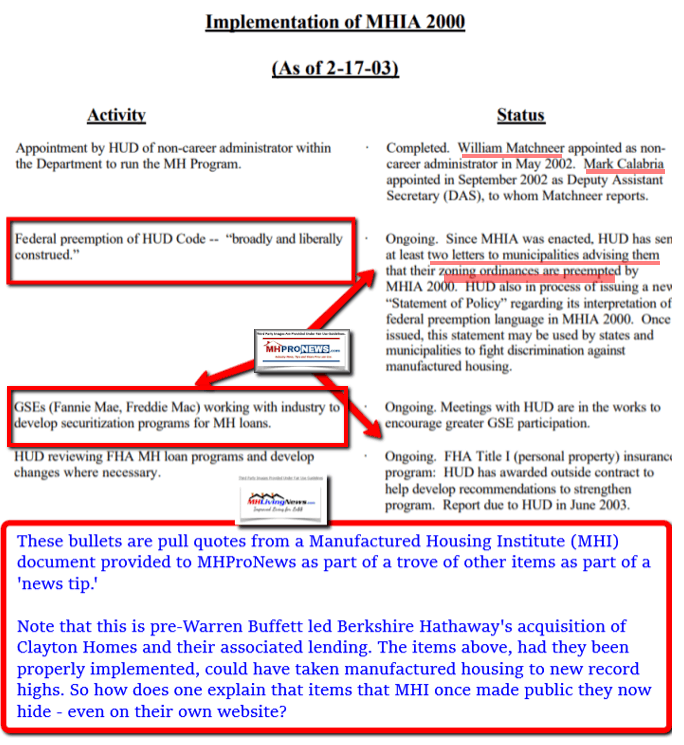
But at some point that apparently began after the dawn of the Berkshire Hathaway era of manufactured housing history, MHI’s focus on getting existing laws properly enforced has arguably shifted. This page below – with comments from MHProNews, but the base document from MHI – is of a document that was once found on the MHI website. There were times when the two trade groups worked in tandem, as noted. But this same page is no longer publicly available on the MHI website. It was obtained by MHProNews as a result of an insider’s tip. Two such documents are shown above.
While MHI claims to be working to mitigate zoning and placement issues, one of their own affiliated state association executives made it clear that such hurdles are getting worse, not better.
While MHI claims to be working for enhanced preemption, during a MHCC conference call, they voted down a measure raised by this publication that would have accomplished just that. The MHCC or Manufactured Housing Consensus Committee is part of the regulatory system established by the 2000 Reform law.
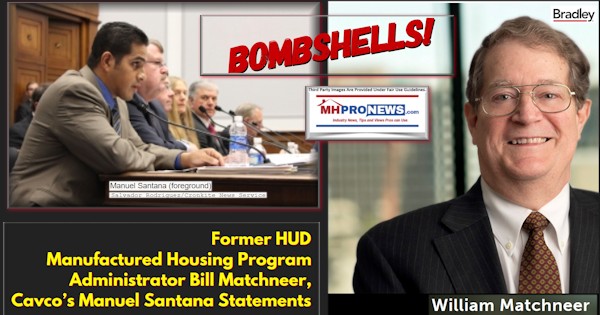
Former Office of Manufactured Housing Programs (OHMP) administrator William “Bill” Matchneer said during that call that his requests for HUD’s General Counsel to enforce the MHIA’s “enhanced preemption” clause.
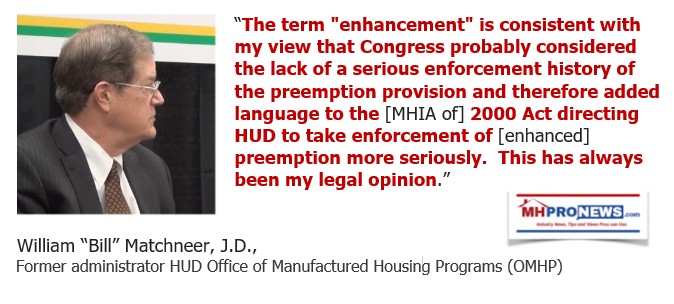
While the Matchneer led OMHP intervened directly from time to time with local officials, he essentially claimed that HUD bureaucracy essentially refused to do so.
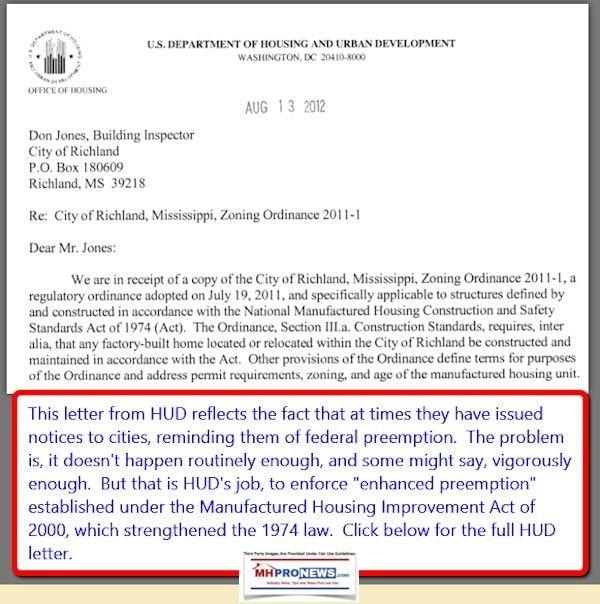
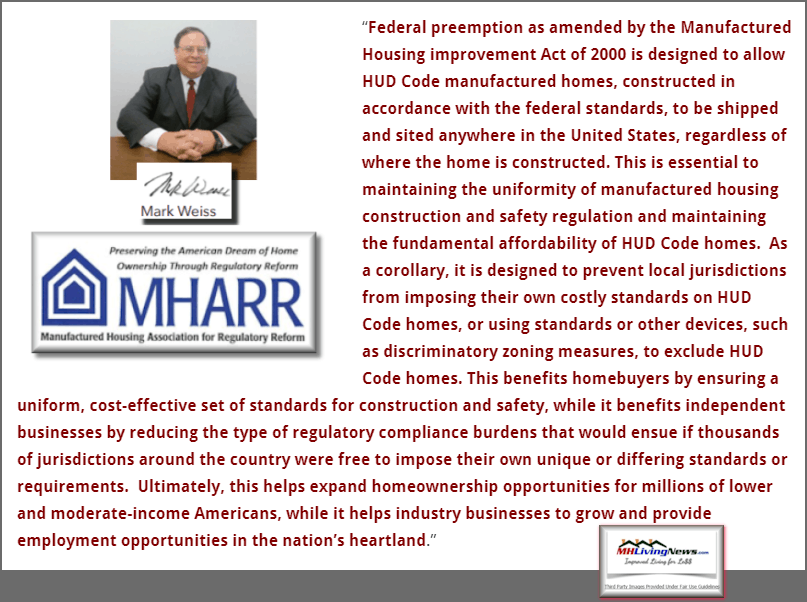
MHARR offered in 2020 to publicly to team up with – essentially MHI-affiliated state associations – to press for the enforcement of the MHIA and enhanced preemption. There were no takers, said MHARR.
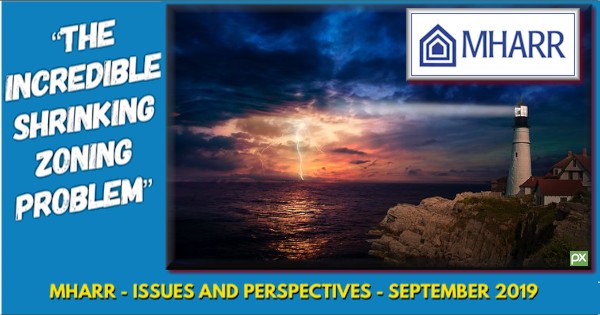
When the Washington Post made the “once obscure” OMHP better known, it was revealed that MHARR had done the push to remove Pam Danner, who sources say were parachuted into the OMHP administrator’s role by MHI insiders. On paper, MHI and MHARR had agreed instead to have —- placed in that post when Matchneer exited.
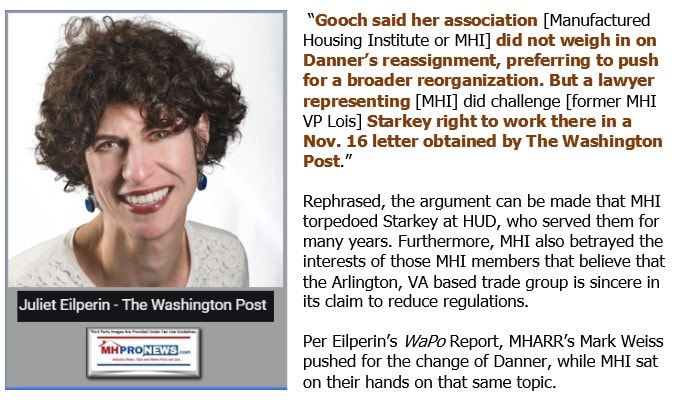
Put differently, what that reasonably brief outline of years of history reflects is that MHI for years – since the Buffett led-Berkshire Hathaway (BRK) era and Berkshire-owned Clayton Homes began to emerge as the power behind the throne at MHI – has postured behavior that they do not then follow through when given the repeated opportunity to do so.
That there were disconnects and dissenting voices even within MHI is made clear by several quotes and linked reports published by MHProNews and MHLivingNews, but oddly not by other trade media who seem to be under the MHI orbit’s sway. That is not mere conjecture.
While acknowledging at times the work done by MHProNews on spotlighting internal industry woes and disconnects, those rivals have done little-to-nothing to consistently point to the years of apparent failure for MHI to do what they collect dues from their trusting members to accomplish.
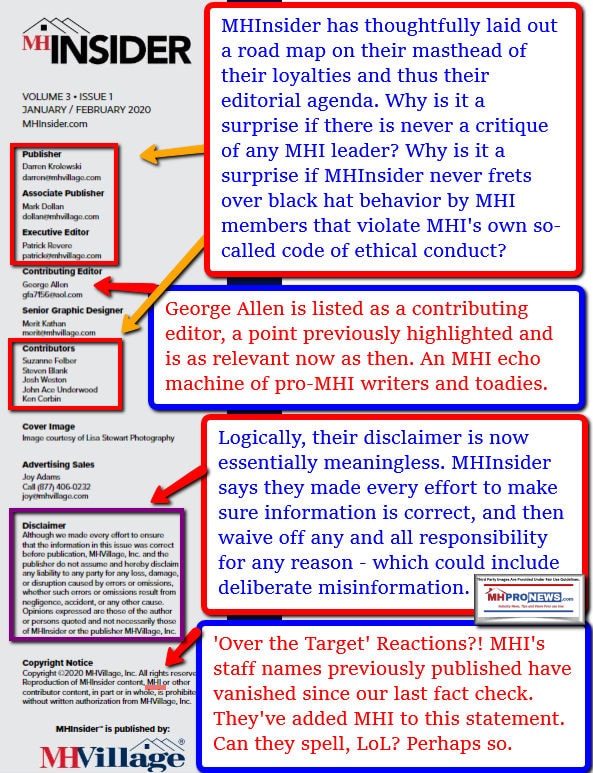
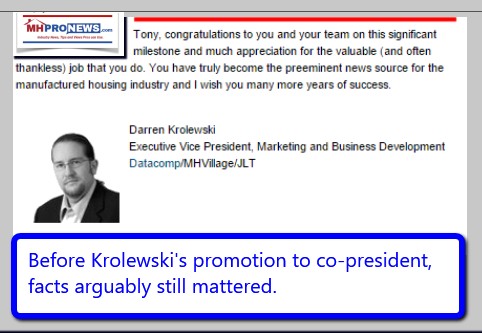
That begs the logical question. What could possibly be the point of such a claimed betray by MHI’s leaders of their own independent members’ interests? Paradoxically, MHI connected voices and documents give the answer. It is to consolidate the industry.
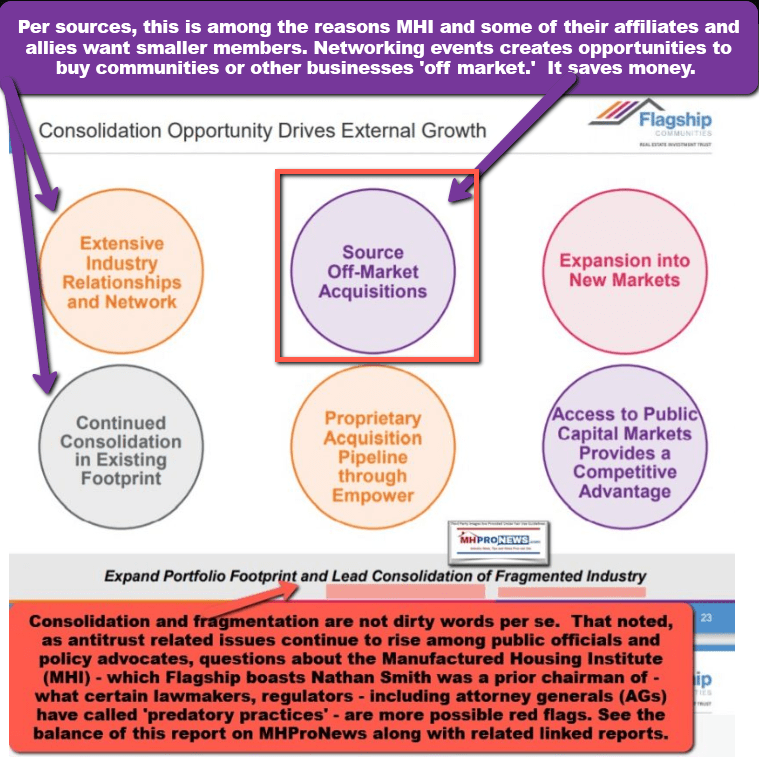
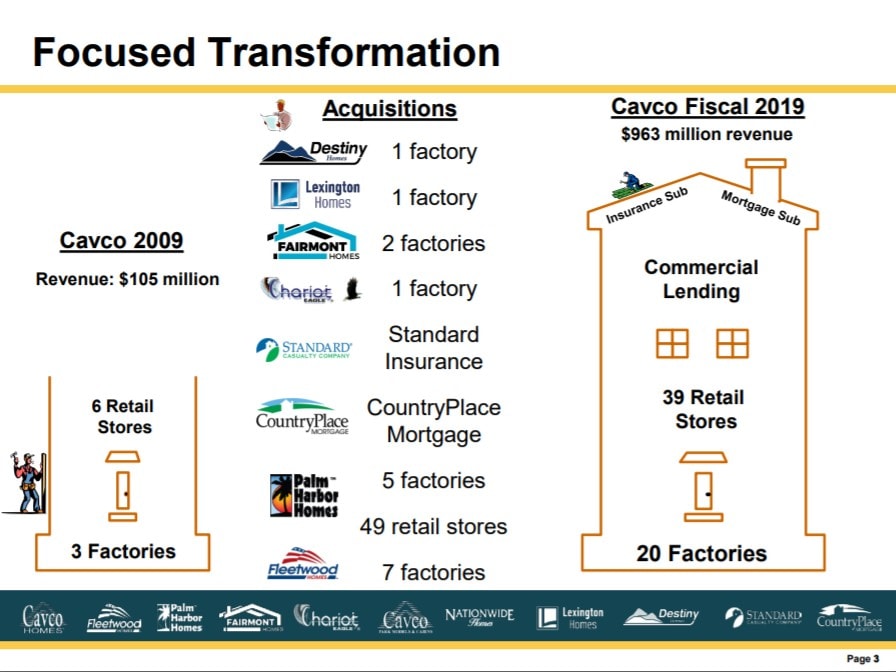
Nathan Smith, co-founder of SSK Communities which has since rebranded as Flagship Communities and has gone public, told MHProNews the following on a video recorded interview. Note that the video was recorded prior to some of the egregious problems with SSK/Flagship that later emerged. That makes the comments perhaps all the more relevant.
Smith, seen as highly connected in Democratic political circles, admitted that MHI had not always been “forthright” with their own members. MHI, explained Smith – while chairman of MHI’s board of directors – had failed to stop some regulatory issues from emerging. In response to that, Smith said he promised to leave MHI as a more “proactive” rather than a “reactive” trade organization.
But Smith also laughed as said that he wanted to keep others from entering into the manufactured home profession, because he wanted all of the communities for himself. What at the time seemed like a jest has in hindsight emerged as part of SSK’s publicly stated game plan in their formal pitch to investors.
Now perhaps even more notorious MHI member Frank Rolfe ripped Smith and his company for sparking controversies that led to a class action lawsuit by SSK’s own residents against his firm. One must keep in mind that when Rolfe said this, some of his more notorious controversies had not yet come fully to light for industry professionals.
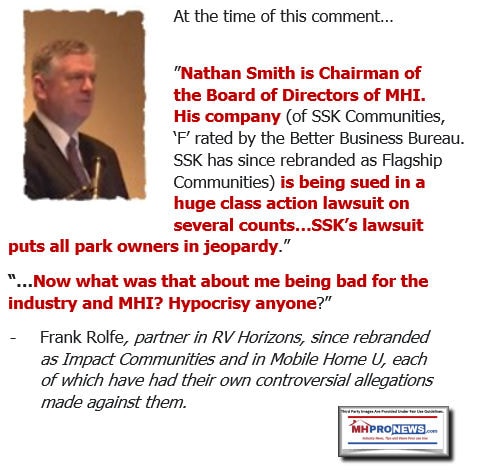

Former MHI President and CEO Chris Stinebert in his exit message before his non-disclosure agreement (NDA) kicked in essentially slammed the emerging behavior of his own trade group.
What emerges in hindsight is a picture of MHI members pointing the finger at MHI members. So, it is not just MHARR or critics on the outside that have blasted MHI. Insiders have done so too.
That manipulation is on two of the key issues that are based upon existing law. That would be the MHIA, DTS, and various other federal lending programs, like the much-needed FHA Title I reforms.
On paper, MHI and MHARR seem to agree on these matters. But in practice, despite posturing, MHI is arguably saying one thing, but doing another. A closer look at the lending side of this controversy is found in the new report linked below, which cites fresh revelations from the CFPB and other new fresh insights by MHProNews that cites MHI insiders as well as others.
Masthead
That MHI is posturing instead of doing is illustrated by a comment from now former MHI Vice President of Government Relations Jason Boehlert.
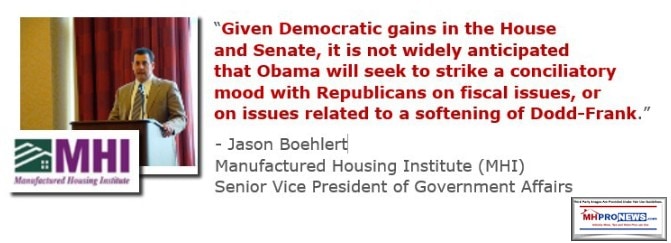
Boehlert made that statement of truth hiding in plain sight. Tim Williams, President and CEO of Berkshire Hathaway owned 21st Mortgage while he was chairman of MHI, said this in an MHI meeting.
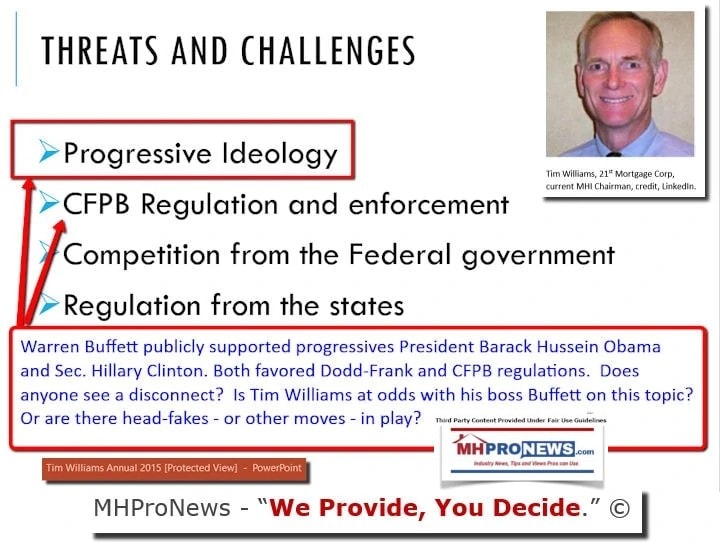
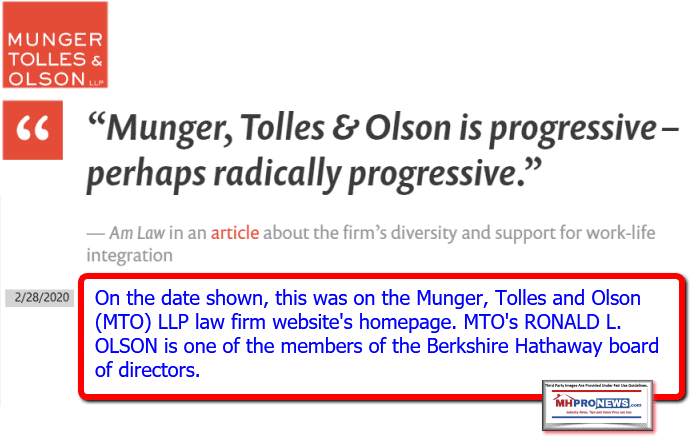
But in hindsight, the truth of Boehlert’s admission was hiding in plain sight all along. After all, Warren Buffett led Berkshire had publicly supported Obama-Biden’s candidacy and re-election. President Obama in turn supported the Dodd-Frank Act that emerged in a form that hobbled manufactured housing lending.
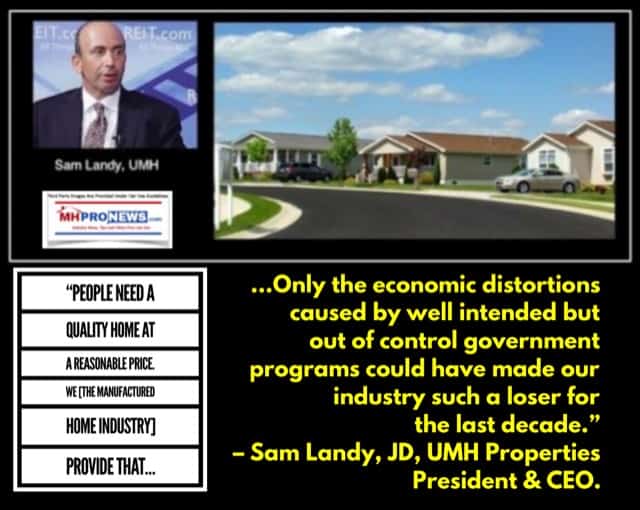
For years, MHI postured trying to change a law that Buffett openly and de facto supported. The ultimate access, to use the Biden-campaign point, was Buffett sitting with then President Obama. Had Buffett wanted to tweaks to Dodd-Frank, couldn’t he have asked for it and gotten it?
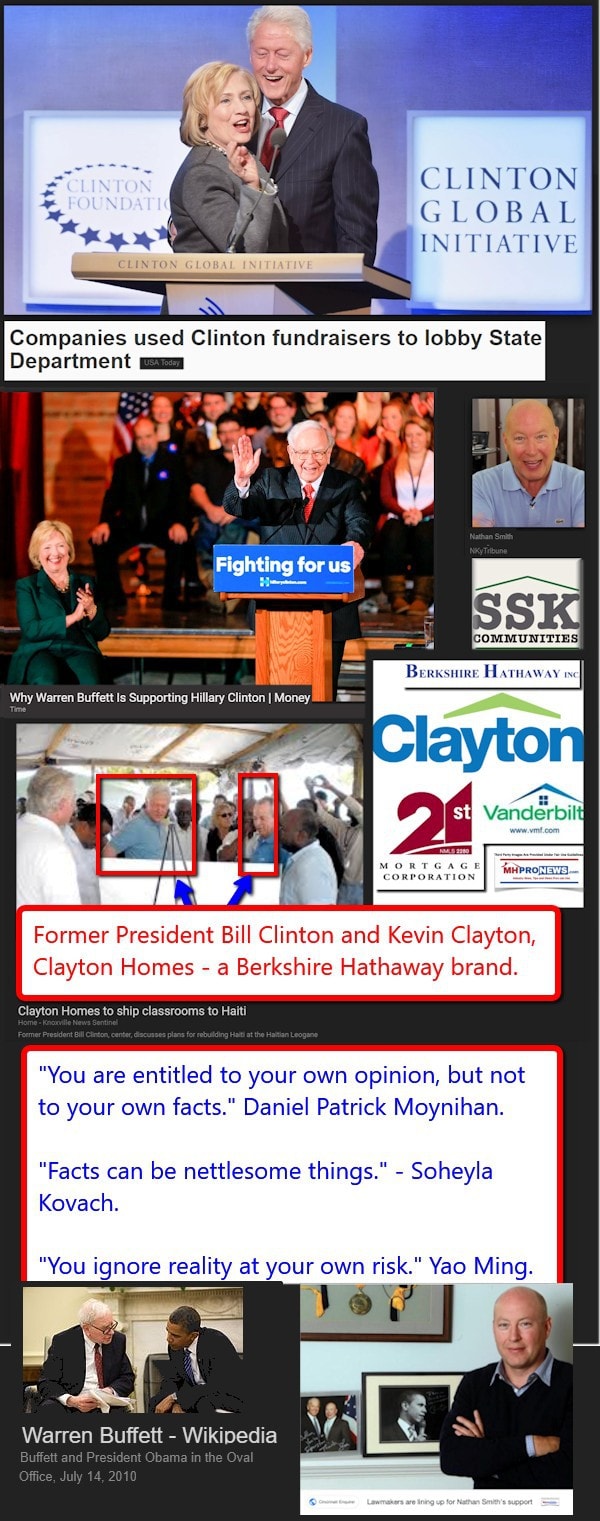
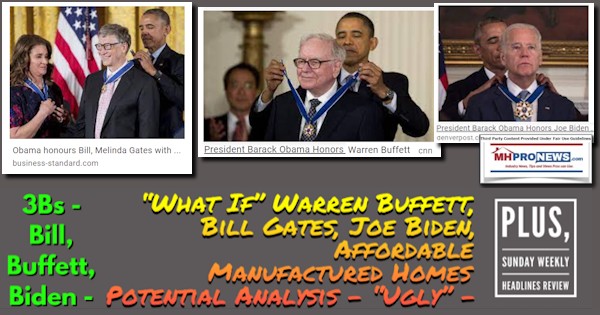
Added Insights, Summing Up, and Conclusion
Buffett is a self-professed reader, student of history, and of human nature.
Third party researchers who have no direct skin in the game of manufactured housing have made evidence-based arguments that manufactured housing has been subverted by forces in the private sector as well as in the federal government. Note, that there are nuances, such as nomenclature, in what follows that merit refinement. That said, the thrust of these concerns have demonstrably been shown to be backed by year evidence. Rephrased, there is no good excuse for anyone to think that this will fix itself without serious effort base don their contentions, or worse still, that their respective claims don’t exist.
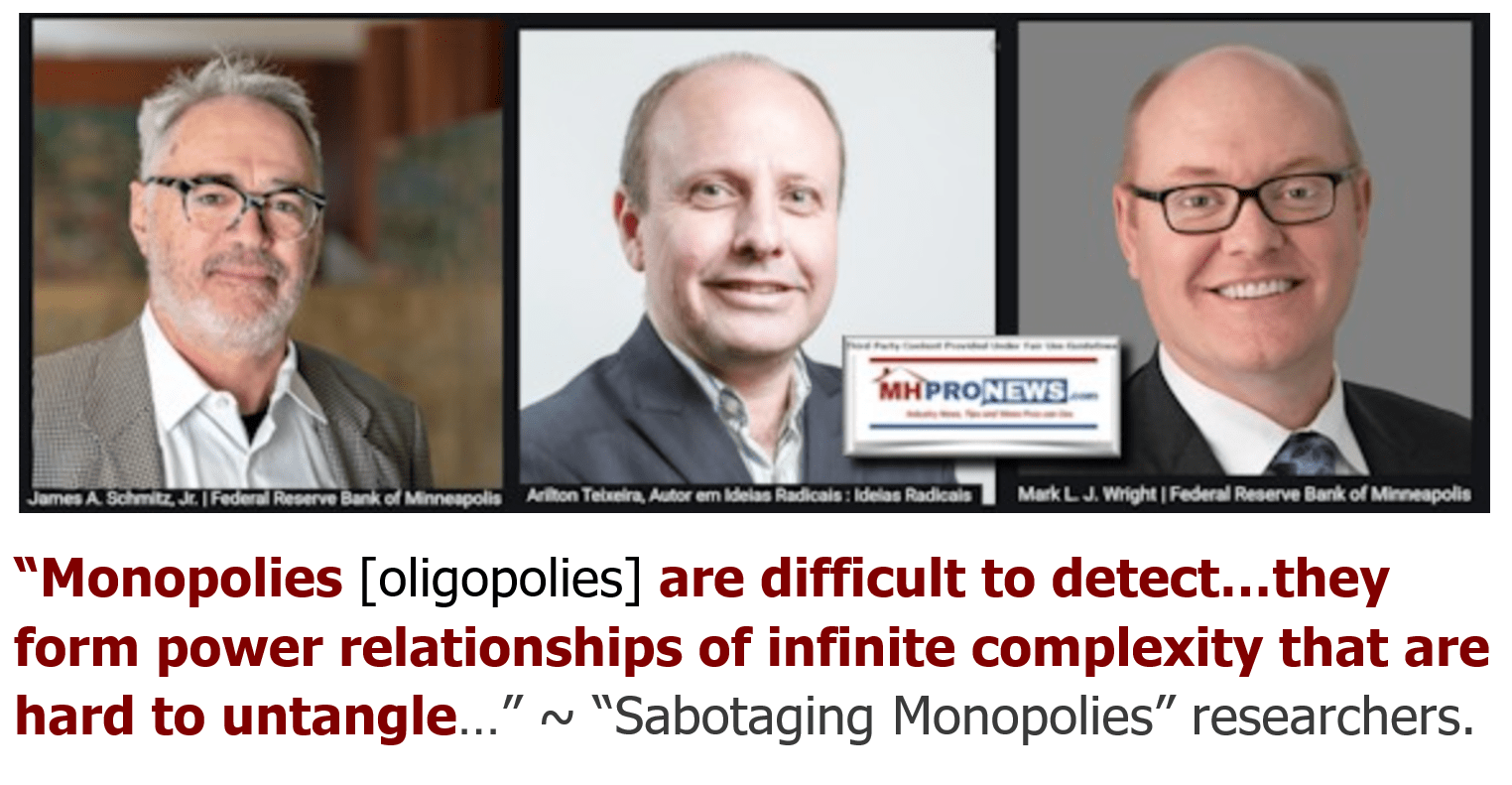
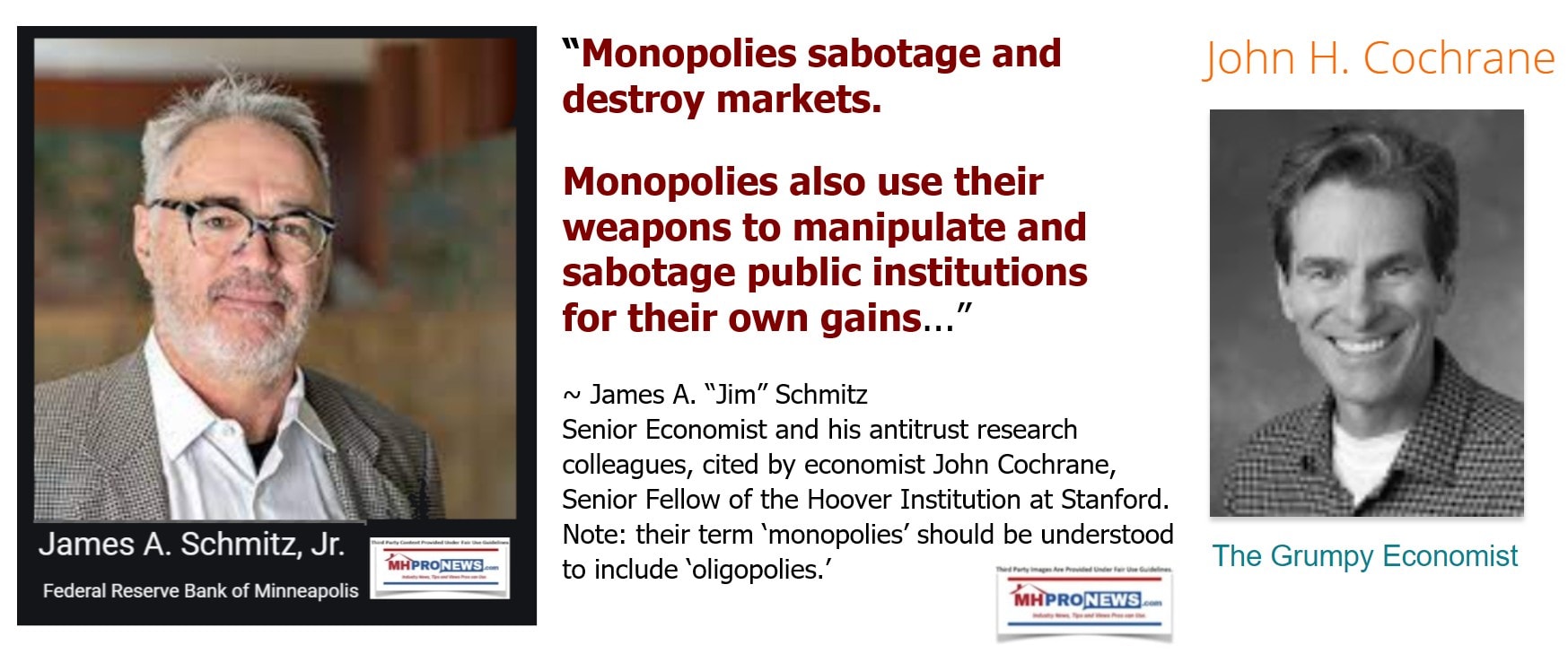

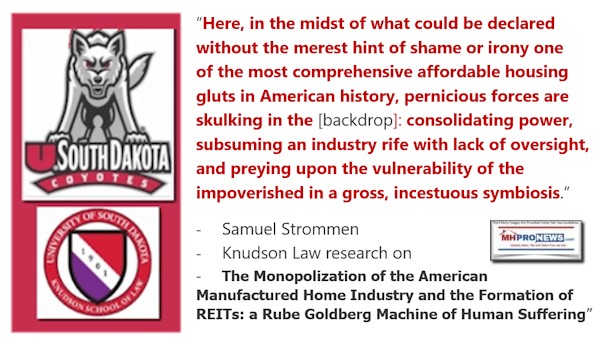
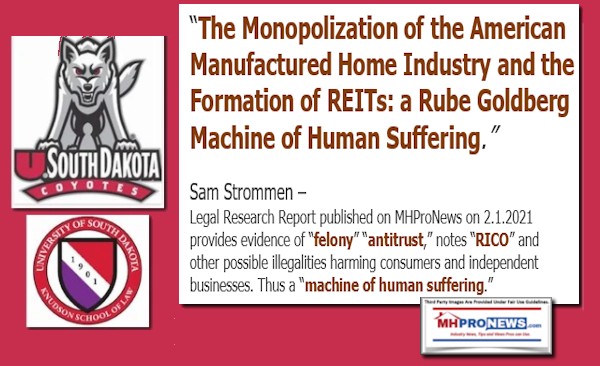
There is an evidence-based argument to be made that for decades, political, bureaucratic, and private interests have colluded in various ways on various issues to benefit a few at great cost to the many. The purpose of the preface at the top of this news-analysis was to demonstrate that point based upon clear evidence. So, when trillions have been lost, and priceless blood was spilled in various foreign and domestic adventures that proved over time to be illusory, it is no stretch of the imagination to realize that something similar can be occurring in affordable housing and the manufactured home profession.
That is not to say that every politico, every bureaucrat, nonprofit or every business is corrupt. Indeed, what this same report reflects is that there are those who have spoken out in the face of corruption from often powerful figures.
The “illusionary effect” makes the big lie, paltering, and various methods of manipulation a demonstrable reality.
It has long been known that bureaucrats can subvert the regulations that they are charged with enforcing.
The solution in the light of the facts are simple yet nuanced.
- The pattern above must be exposed and understood. Doing so is how to avoid that response from those who may want to wave their hand and attempt to dodge responsibility with false claims of it being a mere ‘conspiracy theory.’ There are reasons why RICO and other laws exist, in part, because authentic conspiracies do occur. MHI admits as much because they have an antitrust warning statement, which is ironically arguably laced with concerns that bear investigation.
- There are ample examples of apparently corrupt practices inside manufactured housing evidenced by insiders and outside researchers alike. This relative brief outline ought to be sufficient to cause public officials at the state and federal level to probe these matters with subpoena powers, and taking testimony under oath.
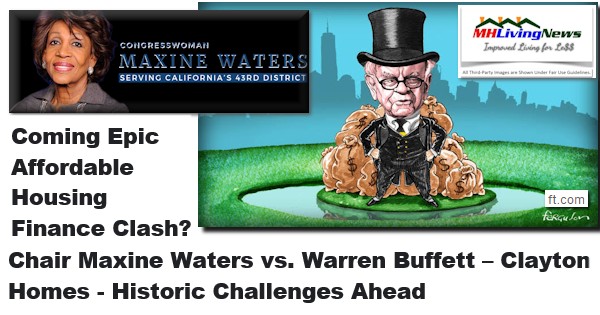
- If the Biden-Harris and others on their team are sincere in their claims, they should support such a probe with transparency and swiftness.
- If Biden-Harris and others in their administration or supporters throw up road-blocks or attempt to deflect from these concerns, then that should be a red-flag. They made campaign promises of transparency and to root out corruption in public office between federal officials’ private interests. This is an acid test of the authenticity of that campaign pledge. Indeed, their campaign statements are one more data-point that such corruption exists. If it didn’t why would they campaign on it?
- Past and present HUD Secretaries and other federal officials need to be called into testify under oath from bipartisan committees and/or state based investigations. MHProNews stood virtually alone in the industry in calling on the Trump Administration to withdraw the nomination of Brian Montgomery. The reasons where conflicts of interest.
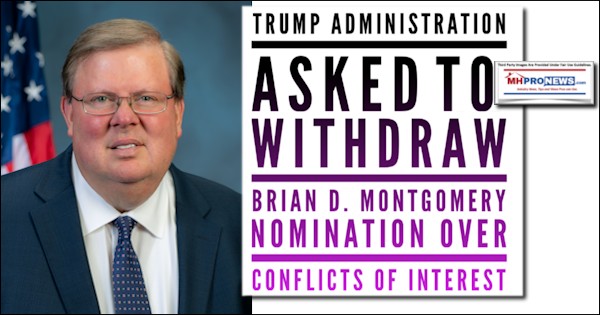
- Affordable housing is indeed in crisis. Congress passed the laws 13 and 21 years ago respectively to deal with these issues. The fact that there are voices across the political and advocacy divides that say that those laws have not been properly enforced are reasons enough to probe that cause and solutions to these matters.
- What is arguably routinely not necessary is that new laws be passed. Existing laws should be enforced. Calling for new laws, when existing ones aren’t being enforced can be fancy footwork on the part of those who wish to cover up the pattern outlined above.
There should be widespread agreement that minorities and all Americans of whatever background should be given a legitimate opportunity to enjoy their part of the American Dream. But words alone, no matter how fancy, will not accomplish that goal. Even after the Civil Rights and Voting Rights Acts were passed, Rev. King kept fighting for the rights of the common man of whatever background. In our time, those who sincerely care about social and economic justice should do no less.
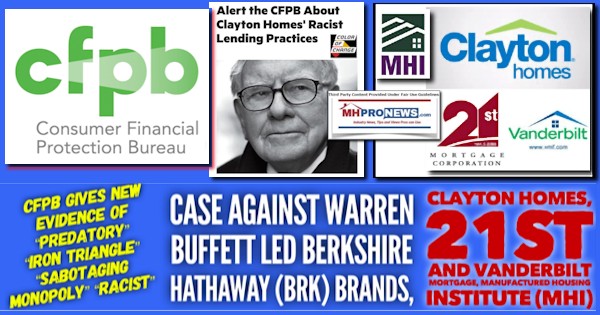
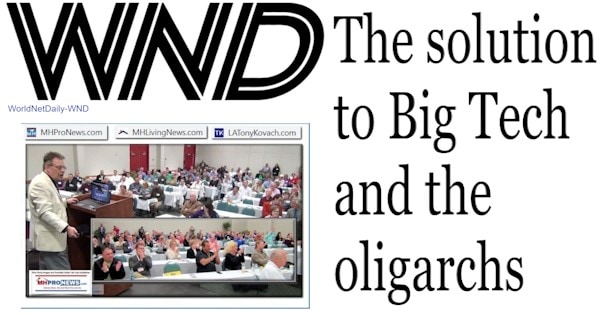
See the linked and related reports to learn more. But the bottom line is simple. There is ample evidence that the system has been manipulated to advantage a few while harming the many. It is up to current public officials of good will to carefully explore the evidence, to document the matters with testimony under oath, and then apply state and federal laws to punish those found apparently guilty of such abuses. Otherwise, history will keep on repeating the sorry pattern noted above.



Our thanks to you, our sources, and sponsors for making and keeping us the runaway number one source for authentic “News through the lens of manufactured homes and factory-built housing” © where “We Provide, You Decide.” © ## (Affordable housing, manufactured homes, reports, fact-checks, analysis, and commentary. Third-party images or content are provided under fair use guidelines for media.) (See Related Reports, further below. Text/image boxes often are hot-linked to other reports that can be access by clicking on them.)
By L.A. “Tony” Kovach – for MHProNews.com.

Tony earned a journalism scholarship and earned numerous awards in history and in manufactured housing.
For example, he earned the prestigious Lottinville Award in history from the University of Oklahoma, where he studied history and business management. He’s a managing member and co-founder of LifeStyle Factory Homes, LLC, the parent company to MHProNews, and MHLivingNews.com.
This article reflects the LLC’s and/or the writer’s position, and may or may not reflect the views of sponsors or supporters.
Connect on LinkedIn: http://www.linkedin.com/in/latonykovach
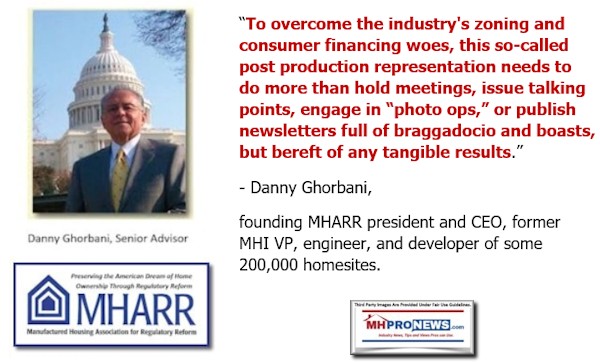
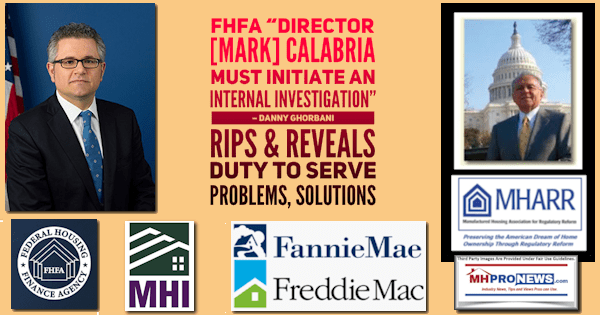
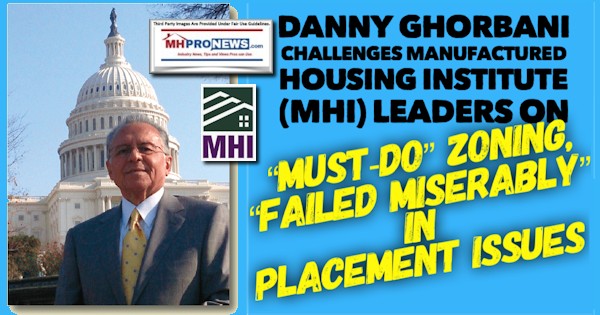
Related References:
The text/image boxes below are linked to other reports, which can be accessed by clicking on them.
